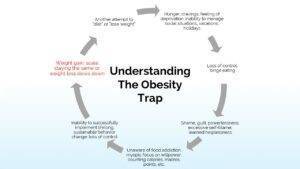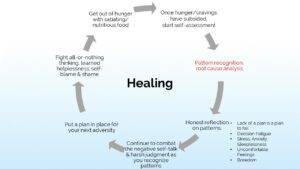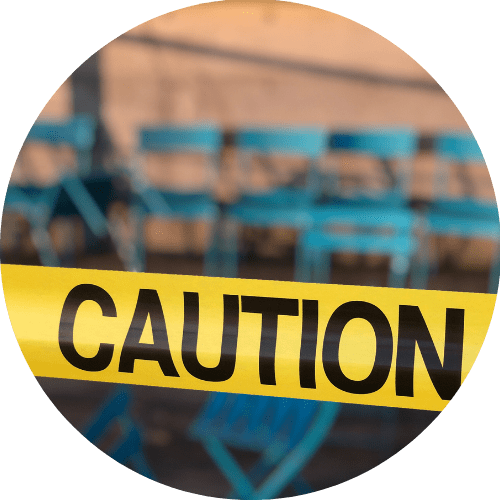The scale. A combination of glass, metal and springs that can be a useful tool to give us information about our current gravitational pull on earth. Data, a number. Nothing more, nothing less.
And yet? And yet.
If you have spent any time attempting to lose weight, you more frequently see it as a heat-seeking missile targeting our most vulnerable parts, often attacking them with unyielding ferocity. You wake up in the morning ready to take on the day, get on the scale and it is, without explanation, a few pounds up from the day before. Even though you know intellectually that you have kept to your plan, this sets off a chain of thoughts and emotions that can derail the best of us. The day, barely started, is now ruined, and you begin taking an inventory of all that you’ve eaten in recent days, obsessing over all the diets you’ve previously failed at, all the workouts you didn’t do, all the ways in which your body and weight have been a massive and embarrassing disappointment, the shame and self-loathing sinking you further and further before your day has even begun.
It is, I believe, our inner food terrorist, the part of us that is either addicted or chronically eats in ways that do not align with our health goals, that takes the information the scale provides and without a second thought, cuts us to our core, leaving only misery in its wake. This dark passenger weaponizes our weaknesses and manipulates everything we know in order to get what it so desperately wants: to roam freely in our psyches, breaking down our resolve until the only recourse is to quiet it down with food.
Reality check: it takes at least a few weeks before any eating regimen can show meaningful results – that means fat gain and fat loss. Daily fluctuations on the scale mean nothing, at least not in terms of our value as a human being, and yet, these changes launch us into a tailspin, and often into a case of the “F-its” where the answer to every question ultimately leads to eating, and often waaaayyy off plan.
So, what do we do about it?

Recognizing the patterns that lead to eating in ways that do not match our goals is instrumental in cutting off a chain of events that in the past has left us feeling powerless, as if overeating, just happened, and we have no say in our behavior because we have no willpower. “I just couldn’t do it.” “I wanted it.” “I’m a stress eater.” “I’m just weak.”
To wit, does the following chain of events and thoughts sound familiar?
Event: Weight gain or the perception of gain, not losing weight on the scale when you’ve been “so good,” feeling bloated, seeing an unflattering photo or wearing clothing that feels snug.
Thought #1: “Omg I am so fat.”
Thought #2: “I’m going to start a 48-hour fast. No…72. Or maybe 5-days. Then I’ll go carnivore. Maybe I should work out twice a day? Train for a 10k. Train for a marathon. Ugh, why am I so disgusting?”
Thought #3 (often much later where it can be difficult to associate with the pattern): “I want a cupcake.” “I want some Lily’s and nuts.” “Just a little something. I know it’s late and I’m not really hungry, but it’s just a little something.” “I’ll start again tomorrow (or Monday, after the holidays…)”
This was my thought pattern recently after seeing a photo of myself I found particularly unflattering. I went from “I am still so fat”-mode directly to super strict diet-brain and then within a short time the pendulum swung all the way to binge and overeating mode.
My nervous system was activated with panic and stress over perceived weight gain, which feels terribly unsafe for me after a lifetime of diet failures and learned helplessness. And so, I nurtured and protected myself with the dopamine-promise of weight loss thru over-restriction. Then, I am stuck in the cycle depicted in the image above, and the only possible reaction to severe restriction? Eat. Binge, with either off-plan foods or too many keto “treat” foods. And while this is counterproductive to my stated goals, it also feels safe in the most familiar way possible.
A WAY OUT…
At first: choose satiating foods that squash hunger, and when you are ready, each time you eat in a way you would like to improve upon, notice the thought patterns that preceded the overeating, what you were telling yourself, what the situation was like before the intrusive food messages got so loud, they couldn’t be ignored.
 If you have become so adept at not hearing these thoughts, mostly disconnected until you awaken to your behavior surrounded by empty food containers wondering how you got there, then the work may be that you need to start noticing the desire to eat before you can begin to identify what led to the food. When the urge to eat strikes, ask yourself: Why now? What changed from a few hours ago when the thought of food was pleasant, but otherwise neutral? What was the trigger? Was it a person, a thought, a feeling, a situation? Was it an inside job? Are you hungry? Are you tired, stressed, angry, happy? Do you want one cookie or all the cookies? Be specific and be curious.
If you have become so adept at not hearing these thoughts, mostly disconnected until you awaken to your behavior surrounded by empty food containers wondering how you got there, then the work may be that you need to start noticing the desire to eat before you can begin to identify what led to the food. When the urge to eat strikes, ask yourself: Why now? What changed from a few hours ago when the thought of food was pleasant, but otherwise neutral? What was the trigger? Was it a person, a thought, a feeling, a situation? Was it an inside job? Are you hungry? Are you tired, stressed, angry, happy? Do you want one cookie or all the cookies? Be specific and be curious.
Once you start to name these patterns and flesh out what they look and feel like, it will be easier to systematically work backwards to dismantle them. This is a process, especially if the other way, chronically overeating, is a well-worn path that feels as comfortable and cozy as an old sweater at the end of a long, stressed-out day.
The process of taking apart, piece by piece, something that is achingly familiar, takes time, but it is possible. One non-negotiable: remove self-loathing from the equation, even though it can be scary to do so. Do this pragmatically, without overly harsh self-judgment.
Being kind and gentle will allow for a quicker recovery from missteps by not overtaxing your already heightened nervous system. If you respond to every thought with “Just stop eating, you’re a disgusting pig” (or something equally as vile) it will only serve to retraumatize your stressed-out brain. Even if this is what you believe after a lifetime of “failing” at every other diet, trust me, you will never succeed with healing your relationship with food if you don’t counteract that thought with one of love and compassion. Like so many lessons I’ve learned along the way to losing weight, this flies against all the things we have ever been taught. It seems counterintuitive, but it is the truth. Have you ever been able to hate yourself healthy? Have you ever been able to pile enough self-loathing and disgust on yourself that it actually helped you do what you wanted to accomplish? No? Then try a new way.
Remind yourself, with all the love you can muster, that you know how the story ends if you succumb to your cravings and after you have recognized the patterns and done an honest self-assessment, begin to implement the harm reduction strategy of “good, better or best.”
A good option is choosing a low carb replacement food for what you are craving. The better option: some leftover dinner or a whole food that is not overly palatable, something like hard boiled eggs or cucumbers. And the best option, buy yourself some time by watching the craving crest and then fall like a wave. If riding it out feels unattainable: do your best to distract yourself long enough for the craving to end.
Some days you will choose the good option, some days the better one, and some days the best, but all of them include the deeper work of doing an honest self-assessment and recognizing the common patterns and themes that emerge.
You know how this story ends if you eat the foods you are craving — you have seen it all play out before. Remember all the other times, not with self-hatred and venom, but with gentle honesty. Choose another ending.
This is how you begin down the road to recovery, toward a more peaceful relationship with food and lifelong sustainable change. Your first inclination to eat? Not in your control: you are human and driven to eat by any number of factors. What you do with the second thought though? It is in your power to choose a different way, forge a new path and rewrite that story.





